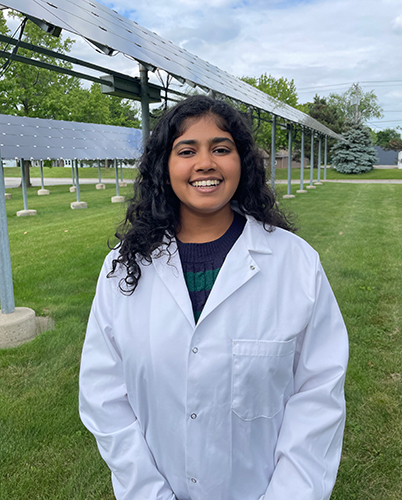Samie Kummar decided to major in chemical engineering because she was intrigued by discovering methods to carry out common processes in a more sustainable way.
Joining the bachelor of science to master of science program in chemical engineering allowed her to save time and money as she worked toward her goals of creating sustainable and renewable energy.

Samie Kumar joined the bachelor of science to master of science program in chemical engineering to save time and money as she worked toward her goals of creating sustainable and renewable energy.
At UToledo, students enrolled in any B.S. in engineering program have an opportunity to fast track a master’s degree by taking graduate-level coursework as part of the undergraduate degree program. The program allows participants to complete up to nine credit hours of graduate coursework while paying undergraduate tuition and using current scholarships and financial aid toward the B.S. and M.S. degree requirements. This gives them a full year head start on their M.S. degree and accelerates the initiation of their research activities.
“In December 2023, I graduated summa cum laude with my bachelor’s in chemical engineering,” Kummar said. “During my bachelor’s, because I was enrolled in the chemical engineering B.S. to M.S. track, I started taking graduate-level classes before I graduated. So, this year I will complete my master’s in chemical engineering.
Kummar is a graduate research assistant at the Wright Center for Photovoltaics Innovation and Commercialization (PVIC) working on her master’s thesis on the development of antimony sulfide solar cells in collaboration with the Department of Physics and Astronomy.
“My goal is to continue to work in the renewable energy development field after graduation,” she said. “As a chemical engineering student, I really appreciated the multidisciplined approach in the PVIC. Dr. [Randall] Ellingson from the Physics Department really took me in and welcomed me, and Dr. [Glenn] Lipscomb, my graduate advisor in the Chemical Engineering Department, really helped me to explore PV from a different perspective.”
“Since meeting Samie through her volunteer work with Glass City Community Solar, she has shown enthusiasm and dedication to working with PVIC to develop expertise in the materials science of solar cells used to generate electricity,” said Ellingson, a professor in the Department of Physics and Astronomy and Wright Center for Photovoltaics Innovation and Commercialization Endowed Chair. “Once she joined our team, she hit the ground running with her professional and optimistic attitude, and her clear commitment to learning new concepts and laboratory techniques. She’s now a key member of our team of scientists working to push scientific understanding and solar cell performance to very high levels. People are very excited about the promise of our work.”
Lipscomb, a Distinguished University Professor of chemical engineering, added how fun it is to work with Kummar.
“Her enthusiasm and drive are contagious,” he said. “I know her work will help enable the production of more efficient solar cells and direct future research efforts.”
Through her first three co-ops at First Solar, Kummar said her interest in sustainability and renewable energy has increased.
“I interned in product management, technical sales and application engineering, and manufacturing and integration engineering,” she said. “I got to work with solar panels from material analysis on small-scale coupons to assessing the overall large-scale manufacturing process to testing and certification of our panels to selling panels and installation in the field.”
Besides her research, Kummar has been heavily involved in The University of Toledo Engineering Council (UTEC) for the last four years and was part of the executive board for three semesters. Her involvement in UTEC and the Honors College, led to hosting the Women in STEMM panel and the Engineering Leadership Summit, an all-day event where more than 80 students received headshots and attended workshops and a career panel that each focused on the impact of sustainability in engineering and the community with professional speakers from across the Midwest.
When asked who had the greatest impact on her journey as a Rocket engineer, Kummar said Dr. Matthew Liberatore, a former professor and undergraduate director in chemical engineering.
Kummar worked under Liberatore as a rheology undergraduate research assistant for almost three years characterizing xanthan solutions as drag reducers for geothermal piping networks, another form of renewable energy. Kummar presented this research at the American Institute of Chemical Engineering (AIChE) Regional Conference in Chicago, placing first for the entire North Central Region.
“This qualified me to attend and compete in the AIChE National Conference in Orlando in November and I placed second internationally,” Kummar said. “Placing second was a wonderful achievement not only for me but also for our University as this was the first time a student from UToledo had ever placed at the national level for the student research competition.”
“Dr. Liberatore had a huge impact on my development as an engineer and as a researcher,” Kummar said. “He truly helped me develop a sense of confidence in my abilities. I have continued to utilize the skills he has taught me from developing experiments, analyzing data, and presenting my findings in industry and with my new research in photovoltaics.”
“I got to observe Samie from many different perspectives in the last few years,” Liberatore said. “She excelled in the traditional classroom setting in both undergraduate and graduate courses. She is an excellent communicator of her research, which garnered her two awards, and she brings excitement and deep knowledge to her presentations. I fully expect Samie to be the author on one peer-reviewed journal article in the next year, which is the gold standard for academic research and somewhat rare for an undergraduate student to achieve.”